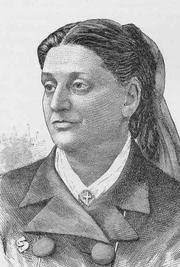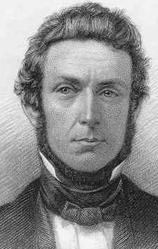
Caroline Augusta White Soule (September 3, 1824-December 6, 1903), a novelist, poet, religious writer, editor, and minister, was one of the founders and the first president of the earliest national organization of American church women, the Woman’s Centenary Aid Association. She was the only missionary sent to Scotland by the Universalist Church, and in 1880 the first woman to be ordained as a minister in the United Kingdom.
Born in Albany, New York, Caroline was the third of six children of Nathaniel and Elizabeth (Merselis) White, of whom only three survived to become adults. Her mother, at first a member of the Dutch Reformed Church, was a descendent of one of the first settlers in Albany. Her father, a Universalist, was a mechanic from Hartford, Connecticut.
Caroline attended a variety of local schools including, when she turned twelve, the Albany Female Academy. Always a fine student, she received at her graduation ceremony from the Academy in 1841 a gold medal for her essay, “The Goodness of God Not Fully Demonstrated Without the Act of Revelation.” A. B. Grosh, minister at the Albany Universalist Church where the White family worshipped, described her at this time as “so small, slender, timid and shrinking that she looked even younger” than her seventeen years.
After graduation Caroline was employed, without pay, as the principal of the female department of the Clinton Liberal Institute in Clinton, New York, a secondary school that had been founded in 1831 by the Universalist Church. In 1842 she taught two terms, about seven months, until poor health compelled her to return to her family home in Albany. While in Clinton she worked with principal Henry Birdsell Soule (1815-1852). “Mutual pursuits at Clinton necessarily drew us together—mutual trials begat sympathy, and who does not know that sympathy is the dawn of love,” Caroline later wrote. “Ere the first term of our engagement closed, our hearts were one.”

A farm boy from Cicero, New York, Henry had converted to Universalism while studying at the Clinton Liberal Institute, 1835-37. Encouraged by the pioneer Universalist minister, Stephen R. Smith, he decided to prepare for the ministry. After studying with John T. Goodrich in Oxford, New York, 1838-39, Soule served Universalist societies in Fort Plain, New York, 1839-41; Troy, New York, 1841-42; and Utica, New York, 1843-44. During 1842-43, while serving as principal at the Clinton Liberal Institute, he preached on Sundays in Clinton and Utica.
Caroline and Henry were married in Albany by their mutual friend A. B. Grosh. After living in Utica for a year they moved to Boston where Soule candidated, 1844-45, hoping to be chosen associate and successor to the aging Hosea Ballou at Second Universalist Society in Boston. Although his peers regarded him as a talented preacher, he was not chosen for this important position. Poor health limited his career. His remaining pastorates were brief: Gloucester, Massachusetts, 1845-46; Hartford, Connecticut, 1846-50; and Granby, Connecticut, 1851. While in Hartford Caroline helped her husband edit the Connecticut Odd Fellow and started writing short stories—always with a proper and obvious moral—for the Hartford Times and for Universalist magazines.
When Henry died of smallpox in early 1852 Caroline Soule found herself an impoverished widow with five children. To earn money she taught school for a while. Her chief income, however, was from writing and work as a religious editor. She prepared a biography of her husband for the Christian Ambassador, which was also issued as a tract. Soon afterward she expanded it into a book, Memoir of H. B. Soule, 1852. As her stories had been well received by the Universalist public, she continued to turn them out for such Universalist magazines as the Rose of Sharon and the Ladies’ Repository. A collection of these tales, Home Life; or A Peep Across the Threshold, was issued by the Boston Universalist publisher Abel Tompkins in 1855. While living in Granby she also edited the Rose-Bud, an annual for young people.
In 1854, in order to live less expensively, Soule moved her family to a log cabin in Boonsboro, Iowa. During these years she wrote two novels, The Pet of the Settlement, 1860, based on her life on the prairies, and Wine or Water: a Tale of New England, 1862, a temperance story. She considered Tompkins, who published them both, the “guiding star of my literary life.” In 1856 Henry Bacon, editor of the Ladies’ Repository (published by Tompkins), made her corresponding editor. Bacon’s successor, Carolyn Sawyer, appointed Soule assistant editor, 1861-65.
In 1863, her children grown up, Soule moved to Albany, New York to get medical treatment for her failing eyesight. In 1867 she moved to Fordham, New York to live in a house that she named “Content” and opened an office in New York City where she continued her writing and editorial duties. She managed, edited, and contributed to the Guiding Star, 1868-79, a semi-monthly for church school pupils. For seven months in 1873-74 she was the chief editor of the New York State Universalist newspaper, The Christian Leader.
In 1869 Soule helped organize the Women’s Centenary Aid Association (WCAA), created to be a part of the Universalist centennial celebration and to raise money for a new endowment fund, named after John Murray, who had begun preaching Universalism in America in 1770. Elected its president, she traveled across the country urging Universalist women to join and to gather money for the John Murray Fund. By the 1870 Universalist General Convention the women’s group had a membership of 13,000 and had raised $36,000.
As the Universalist women found that they liked doing significant work for their faith, in 1871 they formed a permanent organization called the Women’s Centenary Association (WCA). The WCA (later called the Association of Universalist Women) has proved to be one of the most successful American Universalist organizations. Soule served as president, 1873-80, delivering lectures, addresses, and sermons to any group who would listen to her, mailing Universalist tracts, and raising funds for the WCA, the Universalist General Convention, and several newly-established Universalist colleges.
In 1874 Soule preached her first sermon, at the age of 49. On holiday to restore her health in 1875 she visited Scotland. As president of the WCA, which was at that time responsible for raising money for missionary work in Scotland, she was interested in meeting the Universalists there. There she preached, helped with the formation of the Scottish Universalist Convention, and participated in the dedication of a Universalist church building at Larbert. Her first formal pastorate was to the Liberal Christian Association of Elizabeth, New Jersey, beginning in 1876.
In 1877 the WCA voted to send Soule as their missionary in Scotland. Arriving the following year, she preached in Dumfernline, Larbert, Braidwood, Lochee, Dundee, and Glasgow, and in England and Ulster as well. In her second year she settled among the Universalists of Glasgow, whom she helped reorganize as St. Paul’s Universalist Church. In 1880 the Scottish Universalist Convention ordained her, making her the first woman to be ordained in the United Kingdom. It was to take the Church of Scotland until 1968 to approve the ordination of women. She served as secretary to the Convention, 1881-82.
During 1882-86 Soule was back in the United States, helping with the WCA and preaching in Hightstown, New Jersey, 1882-83, and on tour in New England and throughout the West. Marion Crosley, a minister from Utica, New York, meanwhile filled the pulpit in Glasgow. In 1886 Soule returned to Glasgow, where she served until her retirement in 1892. She also filled the Unitarian pulpit in Dundee, 1886-87, while her friend Henry Williamson visited the United States. Williamson, whose church was in one of the poorest parts of Dundee, wrote that “she was most devoted to making the common people share her great hope and faith.”
The Scottish Universalist Convention made her its honorary president in 1888. After retirement she remained in her adopted homeland, among the people she had served and come to love. “I was always tired, for there was never a chance to rest,” she wrote in 1894. “But fatigue in the cause of Universalism is infinitely better than inaction.”
Sources
Material on Caroline Soule can be found in the AUW records at the Andover-Harvard Theological Library in Cambridge, Massachusetts and in the Caroline A. Soule Papers, at the New York City Public Library. Among short memoirs and biographies are Margaret Crissey, “Reminiscences of Caroline A. Soule,” Universalist Leader (July 19, 1919); entries in Eliza R. Hanson, Our Women Workers (1882) and Catherine Hitchings, Universalist and Unitarian Women Ministers (1975); Alan Seaburg, “Missionary to Scotland: Caroline A. Soule,” Transactions of the Unitarian Historical Society (October 1967); entries by Alan Seaburg in Notable American Women (1971) and American National Biography (1999). For an account of Universalism in Scotland, see Andrew Hill, “The Obscure Mosaic of British Universalism: An Outline,” Transactions of the Unitarian Historical Society (April 2003). For analysis of her fiction, see Annette Kolodny, The Land Before Her: Fantasy and Experience of the American
Frontier, 1630-1860 (1984) and Jane E. Simonsen, Making Home Work: Domesticity and Native American Assimilation in the American West, 1860-1919 (2006). The story of Henry Soule is briefly told in Donald Watt, From Heresy Toward Truth: The Story of Universalism in Greater Hartford and Connecticut, 1821-1971 (1971).
Article by Alan Seaburg
Posted August 24, 2002